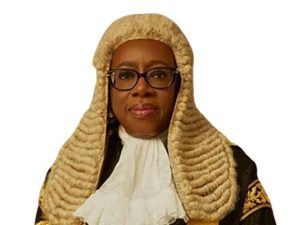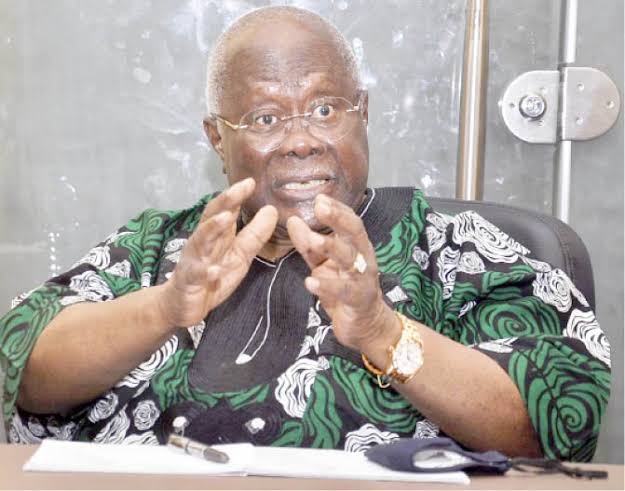Justice Kudirat Kekere-Ekun
The Chief Justice of Nigeria (CJN)
Abuja

Let me congratulate you on your confirmation by the Senate and your swearing-in by President Bola Tinubu as the Chief Justice of Nigeria (CJN).
As the Number One Judicial Officer in the world’s most populous black nation, a bonafide Lagosian and a jurist from a family of legal luminaries, I strongly believe that the judiciary will benefit from your wealth of knowledge. I am also convinced that with you at the helm of affairs of the third arm of government in Nigeria, the Judiciary will now take its rightful position, just like we witnessed from the 1950s to 1980s.
CJN, it will be an understatement for me to tell you that today, and 25 years since the military left the polity for the political class, what is oozing out of the third estate of the realm is becoming offensive to millions of Nigerians, in and outside the country.
Judgements from some judicial officers are becoming embarrassing to patriotic Nigerians and if care is not taken, may derail this democracy.
Judicial rascality has now become the order of the day, especially coming from courts of coordinate jurisdictions.
We now have a situation in which a court, which is thousands of miles away from a theatre of partisan conflict, will give a confusing order and Nigerians will just be wondering what exactly was going on.
Obviously, an appellate court can override the decision of a lower court but I strongly believe that a High Court, federal or state, cannot give a counter order on a case in which it has no jurisdiction against another High Court.
Anything short of this will lead to judicial anarchy.
This is the time for you to urgently call a meeting of the National Judicial Council (NJC) to be attended by judges, from states and federal, to address this anomaly because there are many conflicting judgements from courts of coordinate jurisdiction these days.
Nigerians no longer respect judgements from some judicial officers and you see them boldly analysing the faux pas of these judgements on national televisions. Enough is enough.
From the 1950s to 1980s, judges were feared because they, to a large extent, never compromised their positions.
Decades ago, there was this popular saying in Yorubaland ‘orun we niwaju Adajo’ (you dare not sleep before a judge).
Those were the glorious years in Nigerian judiciary when Judges were Judges but what do we have today?
Judicial chaos, anarchy and confusion to the extent that Nigerians openly say it that some judges are on the payroll of many politicians.
It is that bad.
In many cases, these Nigerians are right because any judgement should be devoid of ethnic, political, religious and partisan colouration but the reverse is the case these days.
In many political cases since the advent of this democratic rule in 1999, millions of people believe, and rightly so, that some judges deliver Judgements, NOT Justice.
They recall the glorious days of former Chief Justices of Nigeria, such as Justice Stafford Foster Sutton (1955 – 1958), Justice Adetokunbo Ademola (1958 – 1972), Justice Teslim Olawale Elias (1972 – 1975), Justice Darnley Arthur Alexander (1975 – 1979), Justice Atanda Fatai Williams (1979 – 1983), Justice George Sodeinde Sowemimo (1983 – 1985), Justice Gabriel Ayo Irikefe (1985 – 1987), Justice Muhammed Bello (1987 – 1995), the first Northerner to become Chief Justice of Nigeria, and others.
They also remember, with fondness, the era of Justice Belgore, Justice Chukwudifu Oputa, Justice Kayode Eso, Justice Fabiyi and others. These are legal giants who stood their grounds against any form of victimisation or unnecessary manoeuvre from the Executive branch of government. You dared not look at their faces or even try to bribe them.
So, in the 21st Century, what exactly is the problem of the judiciary in Nigeria that Nigerians no longer respect judgements coming from some courts? Where did we get it wrong? Why is it difficult for the judiciary to assert its control over politicians and political parties? Why are technicalities being used to affirm electoral heists and in the process, undermine the will of the people and silence them? What is the meaning of a ‘typographical error’ when a judgement had already been delivered?
Also, why should three, five or seven judges decide winners of electoral contests for millions of Nigerians? What then is the essence of campaign and voting on election day? Why should Nigerians trust the electoral process again when they believe, and rightly so, that some judges will eventually impose their will over millions of Nigerians?
Why should judges relegate to the background, Constitutions of political parties but, sadly, impose the will of an individual member, who is seen to be powerful, over party members?
Millions of people will come out on the day of election, queue, collect ballot papers, cast their votes for their preferred candidates, results will be announced and everybody will jubilate only for three, five or seven judges to upturn the popular will of the people. What an affront?
Pitiably, we now have a situation in which politicians, who did not participate in party primaries, are affirmed by the judiciary as the candidates because of ‘technicalities’.
That is why Nigerians strongly believe that some members of the Executive suppress and intimide Judges, just to get favourable judgements.
Electoral verdict should be the sole responsibility of the electorate but it has now been turned upside down. It is now “government of the judiciary, by the judiciary, for the judiciary”.
CJN, democracy should be about the people, exercising their fundamental human rights, not being goaded, as we are presently witnessing. Now, Judges select who should be members of the House of Representatives, Senators, Governors and even the President. What kind of electoral system are we running that all vices, electoral crimes, defects and manipulations cannot be checked before the general elections?
Why is there so much confusion in the system now?
These are questions Nigerians want urgent answers to during your tenure as the CJN.
I am sure you will agree with me that politically-motivated judgements, if they don’t affect the country now, will do so in the future. That is why judicial officers must be careful because their rulings can, now or later, undermine the country’s democratic process.
As Nigeria’s Number One Judicial Officer, you should be alarmed over the impact of questionable court decisions on the stability of Nigeria’s democracy.
Judicial institutional strength is the only thing that will bring development in this country. Therefore, the Judiciary must be strong and bold enough to resist pressure from politicians. It does not make any sense for a judge, just to satisfy a political godfather, to turn the law upside down. Judges must be careful because they have the power of life and death. After God, judges are next, so their judgements must be above board. Because of partisan interests, politicians can put judges under pressure but you must not allow this. Judges must be strong in the interest of building a virile judicial institution.
When the Judiciary is compromised, one way or the other, in a democratic system, then democracy is gone.
Pitiably, in 2024, the belief of Nigerians in the Judiciary is shaken. And this is worrisome because if the people don’t believe in the third arm of government anymore, anarchy looms.
Today, many Nigerians point to some corrupt judges who escape unscathed to enjoy their ill-gotten wealth because the system is weak or compromised to do proper investigation.
Any order from our courts must be infallible, perfect, faultless and indefective. But, when people begin to question the judgement of a particular court, it shows that there is crisis in the polity. And this is totally unacceptable in Nigeria of 2024.
The highly respected Justice Niki Tobi once said: “a Judge by the nature of his position and professional calling, is expected to be straight forward, upright, diligent, consistent and open in whatever he does in court and in other places of human endeavour that he happens to find himself. This is because his character as a Judge is public property”.
CJN, sadly, some politicians now use the court as a shield and the highest political bidders are recklessly granted favourable orders.
Over a year ago, retired Justice of the Supreme Court, Musa Muhammad Dattijo, took the judiciary to the cleaners. Nobody could have exposed the rot in the third arm of government better than the septuagenarian jurist. What a shame!
CJN, today, some politicians, who are not better than criminals, have compromised the judiciary. This is not good for the polity. This is not good for Nigeria. This is not good for our electoral system.
Time to stop judicial rascality in the polity is now.
Chief Olabode Ibiyinka George
Atona Oodua of Yorubaland.
Share your story or advertise with us: Whatsapp: +2347068606071 Email: info@newspotng.com















